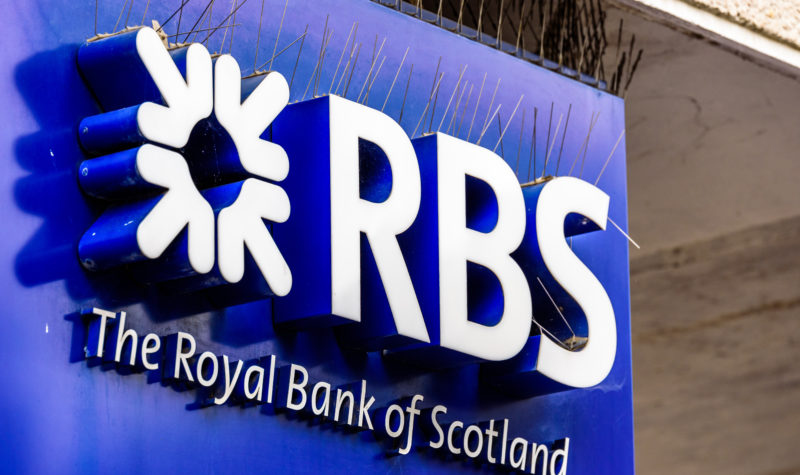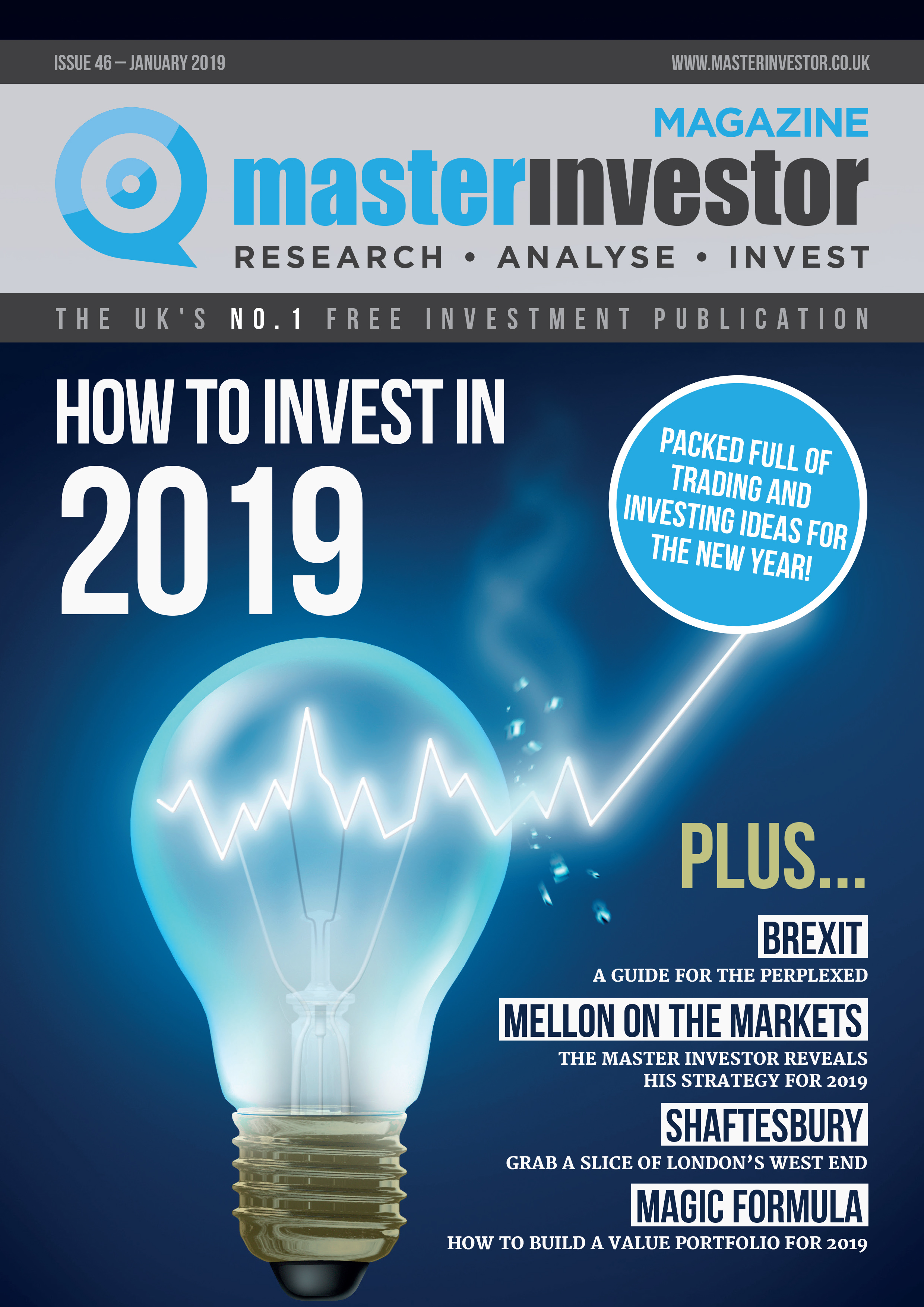Bad news for banks

2018 was a bad year for bank shares. 2019 is likely to be even worse, says Victor Hill.
The long goodbye

Never miss an issue of Master Investor Magazine – sign-up now for free! |
2018 was the worst year for European bank shares since the financial crisis of 2008-09. The iShares MSCI Europe Financials ETF was down by nearly 35 percent over 2018 – though I note that it has risen by 4.8 percent in the first two weeks of this year. But some individual banks fared even worse than that – Deutsche Bank (ETR:DBK) and Commerzbank (ETR:DBK) both more than halved in value last year. The former has not recovered from the sacking of its high-profile British boss, John Cryan, last April after revealing heavy losses. In fact, speculation is now rife that the two beleaguered German banks may be united in a shotgun marriage.
What has gone wrong for Europe’s banks? There are at least four things going on. Firstly, bank profits have been under pressure given lower lending margins. Second, tighter regulation and larger capital requirements since the financial crisis has further reduced return on equity (the more leveraged a bank is, the higher its ROE). Third, central banks are beginning to suck liquidity out of the financial system as quantitative easing (QE) becomes quantitative tightening (QT). This will tend to make funding costs on the interbank market more expensive. Fourth, a flat yield curve has denied banks the chance to make a positive carry on short term funds invested in longer-term instruments.
European tragedy
Some countries have fared worse than others. The shares of Greek banks slumped because of fears that non-performing loans may actually exceed bank capital. The FTSE Athex Bank index which tracks the eight or so Greek banks plunged by 53 percent last year. Meanwhile in Italy, talk of a “doom loop” – the fact that much of Italian state debt is held by Italian banks, as I have discussed recently – has hit bank shares. Clearly, if the Italian state were to default, the country’s banking sector would go down with it – it is as simple as that. The oldest bank in the world, Monte dei Paschi di Siena (BIT:BMPS), started 2018 at €4 and ended the year at under €1.50. (It is down even further in January.)
Other European lenders – particularly French ones – were heavily exposed to emerging markets which fared poorly in 2018. Société Générale (EPA:GLE) is thought to have had large exposures in Turkey. Banks with investments in emerging market bonds have had to mark them down.
Shares in UK banks have not done much better given fears around the impact of Brexit on the UK financial sector. Established banks like Lloyds (LON:LLOY) and RBS (LON:RBS) lost around a quarter of their market cap last year while challenger bank CYBG (LON:CYBG) lost nearly half its value after it announced a merger with Virgin Money. Metro Bank (LON:MTRO) has also halved in value since its £300 million rights issue last July. As it peak last March Metro Bank’s shares were trading at above £40 but just before Christmas were down to as low as 1,600 pence.
American melodrama
The fall in the value of bank shares was not restricted to Europe. JP Morgan Chase (NYSE:JPM) stock began 2018 at around US$113 but ended the year at under $97 (a decline of over 14 percent). Further negative sentiment comes as analysts forecast slower earnings growth in 2019. Additionally, investors have been fearful of the impact of the preternaturally flat yield curve obtaining in the USA.
There are two additional reasons as to why bank stocks are doing so poorly. First, bank stocks tend to reflect fundamentals in the real economy. As markets rise in an upturn banks normally rise ahead of the rest; similarly, if the markets expect a downturn, bank stocks are often sold off first. In technical terms, bank stocks are typically high beta. However, the second reason is more compelling. There is an emerging view that the contemporary banking industry is inherently flawed. Its business model has gone wrong and it is poorly managed.

Never miss an issue of Master Investor Magazine – sign-up now for free! |
Banks are in the business of recycling money (cash) from those who have a surplus to those who are in deficit. This idea is absolutely central to the capitalist system that emerged in the late 18thcentury (by the way, with peripheral Scotland in the vanguard) and which has endured or at least evolved to the present day. Banks need two types of money to fund their operations: bank capital and customer deposits.
In the current market, at least in the USA, bank capital is being dissipated because management is giving away literally hundreds of billions of dollars in stock buybacks. Deposits are under pressure because savers – particularly in the US – no longer trust banks with their savings, preferring money market funds instead.
Loan losses in America (unlike Italy) are at near record lows – but they are trending up. The outlook is for slower economic growth in 2019. If there is a recession, that would result in a sharp deterioration in loan quality and thus a spike in loan losses and a corresponding drop in bank earnings.
Deep-rooted problems
Returns from bank “products” – everything from travel insurance to pension planning – have been falling in the internet age. In the loans market banks are facing competition from fintech-style non-banks. Moreover, since the credit crunch financial engineering of all kinds – often called structured finance – now comes with a health warning.
Contrary to a common myth, it was never the case that low interest rates were bad for banks. So long as lending margins were maintained banks could profit in a near-zero interest rate world. From 2010 to 2015, interest rates were at historically low levels in the US – and they continue to be so in Europe. During this period bank industry earnings hit all-time records. There was a similar outcome from 1933 to 1945 when interest rates were also abnormally low by historical standards.
It is also conventional wisdom that banks cannot grow their earnings when the yield curve is inverted. The yield curve was inverted (with the Fed Funds rate above the 10-Year Treasury yield) for most of the period from 1966 to 1970; 1973 and 1974; and 1978 to 1982. Yet bank earnings were up in every year from 1966 to 1970. The period from 1966 to 1982 experienced the most persistent inverted yield curve. And yet bank earnings were sustained.
Evaluating bank stock buybacks is simple. If the cost of equity is higher than banks’ return on equity then banks should buy back their own stock. But buying back stock reduces capital and therefore increases leverage. So, buying back stock lowers the secular growth rate of bank earnings and thus the present value of future earnings.
Since the passage of the Dodd-Frank Act in 2010 in the USA to the present, bank earnings have risen. The banks were bailed out in the USA and the UK and the banking industry overall was able to continue making money. Though some rescued banks – like RBS which we have now come to regard as a bad bank – never fully recovered and have been slimming their balance sheets ever since.
Bank stocks are doing poorly because the fundamentals are against them. In fact these stocks are doing even worse than might have been expected because there has been a change of perception on the part of investors. Banking is no longer regarded as a license to print money (which in terms of monetary economics, it still is). Investors are now quite wary of the banking sector – even of the challenger banks which promised to change the game by being more consumer-focused and tech-savvy.
Bad banks – or bad management?

Never miss an issue of Master Investor Magazine – sign-up now for free! |
Even after the bailouts of 2009-09, the bankers were up to new tricks, such as rigging the London Interbank Offer Rate (LIBOR) so as to enhance margins. More criminal activity followed, including tax evasion, money laundering and fraud (most notably payment protection insurance (PPI)), sometimes undertaken by some of the world’s most prestigious financial institutions such as Barclays Bank (LON:BARC).
Even Australian banks were culpable – as I reported during a visit to Australia in April last year. All the major Australian banks were involved in a rate-rigging scandal in 2010, focused on the Bank Bill Swap Rate (BBSW) – the Ozzie equivalent of LIBOR. Australia and New Zealand Banking Group (ASX:ANZ), National Australia Bank (ASX:NAB) and Commonwealth Bank of Australia (ASX:CBA) paid penalties, while Westpac (ASZ:WBC) was let off on the dubious grounds that its attempts to manipulate the rate had been unsuccessful. Macquarie Bank (ASX:MQG) was found to have engaged in fraudulent foreign exchange trading. CBA was found to have been involved in large scale money laundering. In fact, Citigroup (NYSE:C) and Deutsche Bank are currently facing charges in Australia around insider trading in ANZ shares.
Bad culture
This all came about because of a perverse business culture – fuelled by egregious pay and bonuses. When I first arrived in the City in the early ‘80s, the idea that My word is my bond, though a quaint old-fashioned notion, still meant something. Sometime between Big Bang (1987) and the Credit Crunch (2008) bankers deliquesced from pin-striped trusted gentlemen to numerate, iPhone-toting spivs.
Even worse, it’s quite clear that the personal touch has been in rapid decline in recent years. When I invested in a restaurant business in the early years of this century, our HSBC Bank PLC (LON:HSBC) manager used to call in for the occasional meal. (Of course the staff were instructed to wine and dine him (it was always a he) – but we felt touched that he took an interest in our progress.) By the time I sold that wretched business some years ago I didn’t even know who our HSBC business manager was – and HSBC had no idea who we were…There was not even any kind of artificial intelligence in evidence…There was nobody there…
I think it was John Maynard Keynes who said that a banker is a man (again) who will never lend you an umbrella if it is raining. Bankers have the mentality of unambitious civil servants who believe, thanks to their inflated salaries, that they are entrepreneurs. They are not entrepreneurs – and very few of them even understand entrepreneurship. The billionaire buccaneer capitalist Jimmy Goldsmith (1933-97) – who was prophetic about the nefarious nature of the European Union, by the way – hated bankers even more than he hated politicians.
These scummy banks will not recover in 2019. Their time is past. Avoid them.
Always worth reading Victor. Many thanks. I agree especially with the comment about what happened after 2008, though I think the rot set in a little earlier. Thank you.
Some figures for RBS show the dire state:
* Return on Assets: 0.17%
* Return on Capital Employed: 0.31%.
Source: Stockopedia.